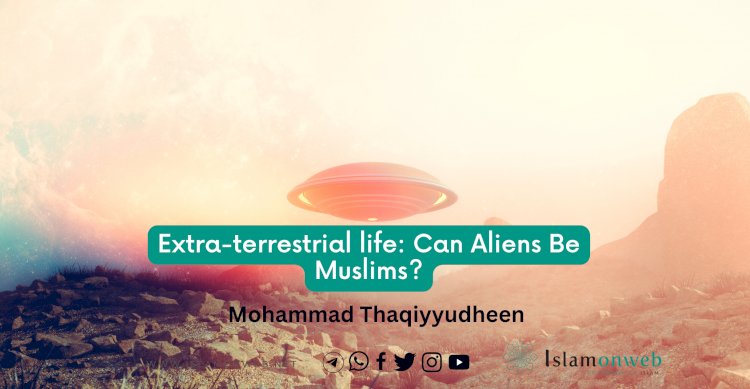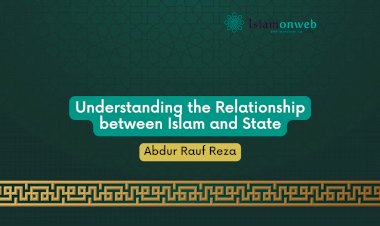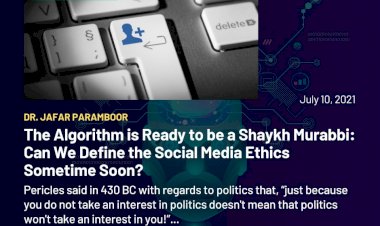Extra-terrestrial life: Can Aliens Be Muslims?
Extra-terrestrial life, more commonly alien, is one of the hottest mysteries that modern science is trying to solve. As an ideology that upholds the credibility of Big Bang theory and universal evolutionary theory, facing a question like “why there couldn’t be any other form of life elsewhere in the universe?” is completely understandable. In an educated society with this scientific curiosity, people are not only sceptical or eagerly waiting for any kind of scientific expedition, but also keen to develop and theorize their own intuitions and assumptions. But the reality is, regardless of the large archives of theories and hypotheses, not even the scientific world has enough information to authentically comment on this topic.
There are rumours about some strange electromagnetic signals that we received decades ago that were being said to be of aliens. Nevertheless, human nature has an innate inclination towards producing and gossiping conspiracies around mysteries and unknown things, we do have a very long history of fantasizing dramas as a desperate vague attempt to make these real. And it was from these notions that the world believed that Egyptian pyramids and crop circles were alien-built, and that is why even the news channels were excited to discuss a tweet that said “we will meet aliens in December 2022”. But the question still remains, “is there any life beyond our Earth?”
Scientific Theories
As a naturalistic ideology that supports and authenticates materialistic evolution, modern science cannot draw a completely sceptic stance on the possibility of extra-terrestrial existence. In this vast universe of 93 billion light years in diameter, concluding that there is life only on Earth is like saying that there is no fish in the ocean, by only observing a spoonful of water! In 1975, famous Italian physicist Enrico Fermi was associated with a theory called the “Fermi Paradox” addressing the improbability of the absence of any kind of extra-terrestrial life in our galaxy, asking why we can’t see them. His prime concern was that our galaxy, Milky Way, undoubtedly has millions of stars like the Sun where there are indeed thousands of Earth-like planets orbiting those stars. Then why intelligent life is not “evolving” on these planets just as it happened here on Earth? While according to the mathematical calculations, the probability of their existence is undeniable. And it is evident that they would have surely gained as much time to technologically develop more than Earthly human beings have, capacitating them for interstellar voyages or Earthly visits. Then why we couldn’t see them? Where are they?
Scientifically, obviously apart from occasionalism, the problem of Fermi Paradox can be answered in two possible ways. Either aliens exist in the universe, or even in our galaxy, but then ‘where?’. Or they don’t exist, but the mathematical calculations won’t allow it if the Big Bang and evolutionary theories are correct. According to the Drake’s Equation (N = R*fpneflfifcL), our own Milky Way galaxy has the capacity to facilitate in generating of at least one hundred thousand intelligent life systems through materialistic biological evolution. The reason for our inability to perceive them, as theoretical physics puts it, might be their existence as a higher dimensional being, meaning they may be living in the 4th or higher spatial dimension. According to the String Theory, a theory that states that the fundamental building blocks of the universe are strings of energy, there could be at least 12 spatial dimensions. Some contemporary Muslim thinkers thus assert that Jinn and holy angels could be higher dimensional creatures, making them invisible to us. And by being beyond the realm of space-time altogether Almighty God could see and interact with every dimension alike. Even though this is a quite mesmerizing theory, it has fundamentally failed to explain the actual problem proposed by Fermi Paradox.
M-theory, an advanced off-shot of String Theory, hypothesises the possibility of multiverse theory (parallel universe), asserting the existence of multiple universes other than ours. This takes a step further in the existential question of extra-terrestrial life, where every universe could have an intelligent life like ours. Upon this concept, materialistic evolutionists, backing up with the principle of causality and determinism, say that there could be a person with your name and appearance living a different life (the mirror-image universe)! Scientifically, there is no necessity for aliens to be in a human-style biological structure, rather they could by all means be non-carbon beings. While the existence of such non-carbon-based biological beings on this very planet cannot be completely denied.
If the question of Fermi Paradox is answered with a negative statement, then how could we explain the mathematical assertions behind it? Well, there are a number of explanations as a reason for the possible non-existence of something that was probabilistically existing. One of the most famous among them is the “Great Filter Theory”. This theory states that the universe is continuously regulating the lifespan of its intelligent beings into a particular period, after that period they are naturally bound to extinct, ever before being technologically advanced to perform interstellar expeditions. That was the reason why could not be in touch with others. Many contemporary political thinkers agree with the pragmatism of this theory considering the possibility of nuclear third war and AI military strategies, which can, by all means, be the cause of the extinction of these intelligent beings.
Islamic perspective
Modern world has started to look upon Islam, especially its followers, searching for a stance on this issue. Islamic theology, as an ideology that describes God as the Creator of the universal existence itself, is bound to an opinion about how diverse the divine creation can be. It is upon this notion that Muslim scholars exhibited a keen interest in the topic of aliens. To begin with, everything that exists in this universe, or even the outer universe, is created by Almighty Allah, whether we are aware of it or not. The Qur’an, which encompasses knowledge about everything, does not clearly indicate non-human biological intelligent beings beyond some ambiguous symbols and semi-mentions. The reason, they say, is that the revelation of the Holy Qur’ân was for a greater purpose, i.e., establishing a monotheistic religion, moreover, the seventh century society was far more scientifically immature enough to grasp the hidden realities of the universe. Nevertheless, Qur’ân or Islam, in general, does not deny the fundamental idea of extra-terrestrial life, but above that, it is observed that there are some indications in Qur’ân to these matters.
In the initial chapter, Qur’an describes Allah as the Lord of the “worlds”, which is a direct notation to the possibility of other worlds that we have no idea of. We could see the traditional interpretations of Qur’an trying to provide unsuitably far meanings because they had limitations in their material knowledge. Allah says: “And He creates what you know not” (16:8). In another verse, Qur’ân mentions:
“Among His signs are the creation of the heavens and earth and all the living creatures He has dispersed throughout them (heaven and earth): he has the power to gather the altogether whenever He wills” (Shurah – 29).
Here “living creature” is denoted by the word دَآبَّة which would linguistically exclude both Jinns and Angels. Therefore, the statement ‘living creatures throughout heavens’ can be an indication towards the existence of aliens. For a very natural question – “Is this 93 billion light-years wide universe created for this tiny humankind?”- Qur’ân says: “We did not idly create the heavens and the earth and all that lies between them” (Dukhan – 38). The modern interpretation of the verse “We have honoured Humankind beyond many of Our creatures”, has a similar implication. In this anthropocentric Earth, it is evident that there is no creature that has a hand over us, so there have to be some creatures whom Allah has recognized with similar or higher dignity, as the verse states that Humankind is not above ‘all’ of his creations.
Ibn Thaymiyya, a renowned Islamic scholar, suggests that the name “Khallāq” of Allah means ‘who creates continuously’, and there is every possibility that He has or is creating similar living beings like us. So, he argues that the conception of aliens is not only plausible by Islam, but it also compliments the implications of divine attributes. Similarly, Ibn Arabi makes this same argument. In his famous work, ‘Futhuhath al-Makkiyah’ he reports a prophetic quoting which goes like “there were more than thousands of Adams before Adam (A) was created”, even though the credibility of this hadith is at stake, this could be a clue to the existence of non-human intelligent beings.
Can aliens be Muslims? Qur’an says that everything in the universe will be subjected to Almighty Allah, the eternal Creator. The Arabic word ‘Muslim’ is derived from the root word ‘aslama’ (أَسْلَمَ) which is a direct translation of ‘to surrender’, so Muslim literally means ‘the one who had surrendered to Allah’, and Islam means ‘submission’. Therefore, in every intelligent society, no matter where they are, there will be Muslims. Because Allah had said: “We surely sent a messenger to every community” (16:36). Likewise, the conceptions of the multiverse and higher-dimension beings are not unconditionally denied by Islam. Even though Ibn Arabi had theorized Jinns to be higher-dimensional beings, they exist on Earth, so technically they are not aliens. To assume the possible existence of aliens is more probable, in Islamic theology than concluding that everything Allah has ever created is merely for this ephemeral tenure of humankind.
References
Ahmad, Mirza Tahir. The Quran and Extraterrestrial Life. n.d. https://www.alislam.org/library/books/revelation/part_4_section_7.html.
Arabi, Ibn. Al-Futuhat al-Makkiyya. Spain: -, 1240.
Darling, David J. Life Everywhere. England: Basic Books, 2001.
Determann, Jörg Matthias. Islam, Science Fiction and Extraterrestrial Life: The Culture of Astrobiology in the Muslim World. London: Bloomsbury Publishing, 2020.
Gross, Kevin W. Plaxco and Michael. Astrobiology: An Introduction. Baltimore: Johns Hopkins University Press, 2014.
Khan, Wahiduddin. The Qur'an. New Delhi: Goodword Books, 2010.
About the author
Mohammad Thaqiyyudheen, S/o Abdul Jaleel Hudawi Vengoor. Degree research scholar, Darul Uloom Islamic Da’wa College, Thootha (affiliated to Darul Huda Islamic University, Chemmad). Keen interest in Islamic philosophy and Islamic academics, with an ambition to become a professional writer for Islam. Bagging some notable achievements in Sibaq National Artfest ’22 has inspired me with my future ventures.
Disclaimer
The views expressed in this article are the author’s own and do not necessarily mirror Islamonweb’s editorial stance.
2 Comments
-

-

It is not completely sure that aliens exist in Islam. I think that they do but, Can you clarify that in the last surah(Surat-un-Nas), it is written only Man and Jinn, and it is written completely clarifying about the beings, not mentioning anything else and if aliens exist and are intelligent than humans, what they know about God or how then humans be superior to them as humans are the best creations?
























Leave A Comment